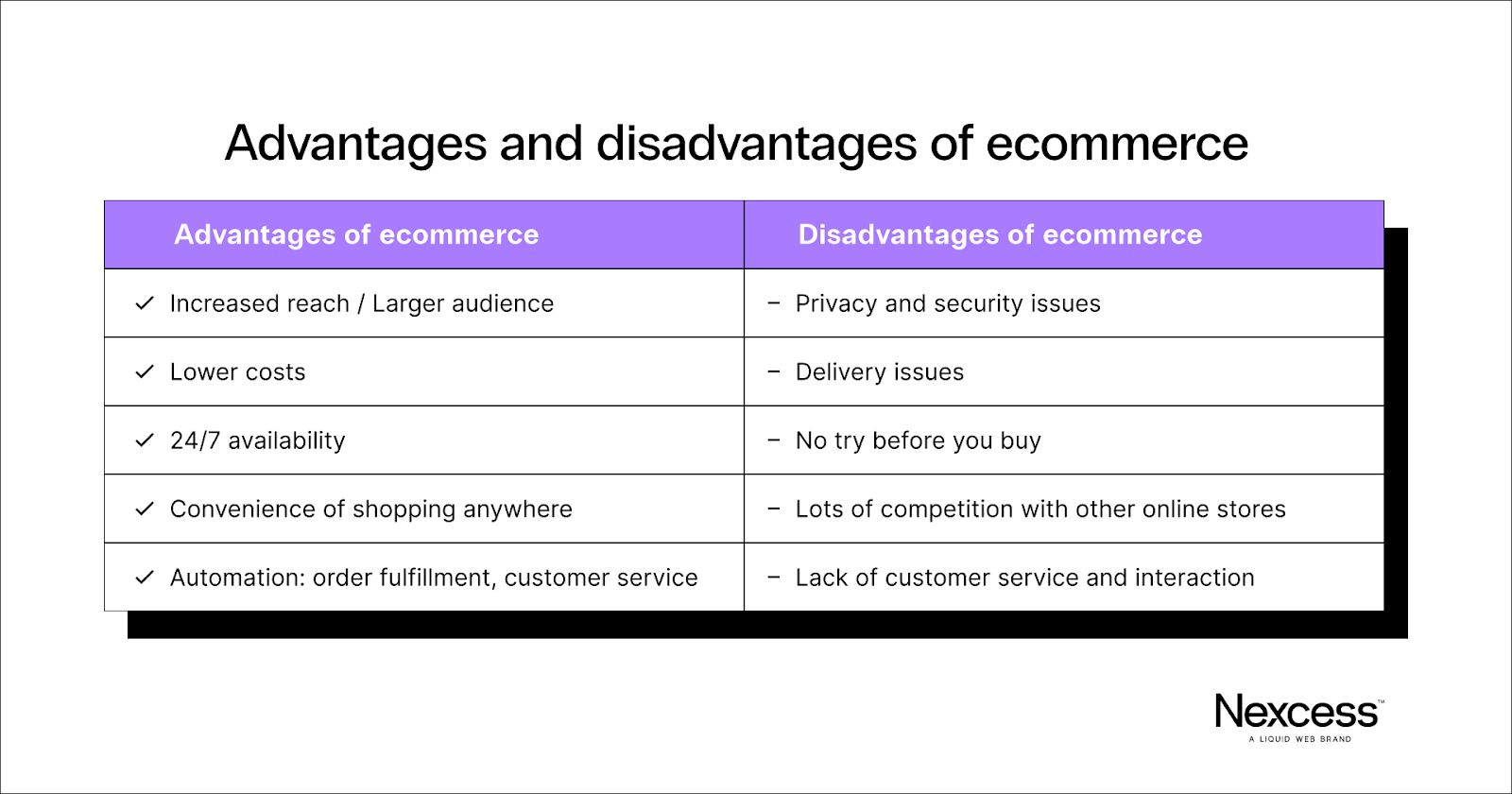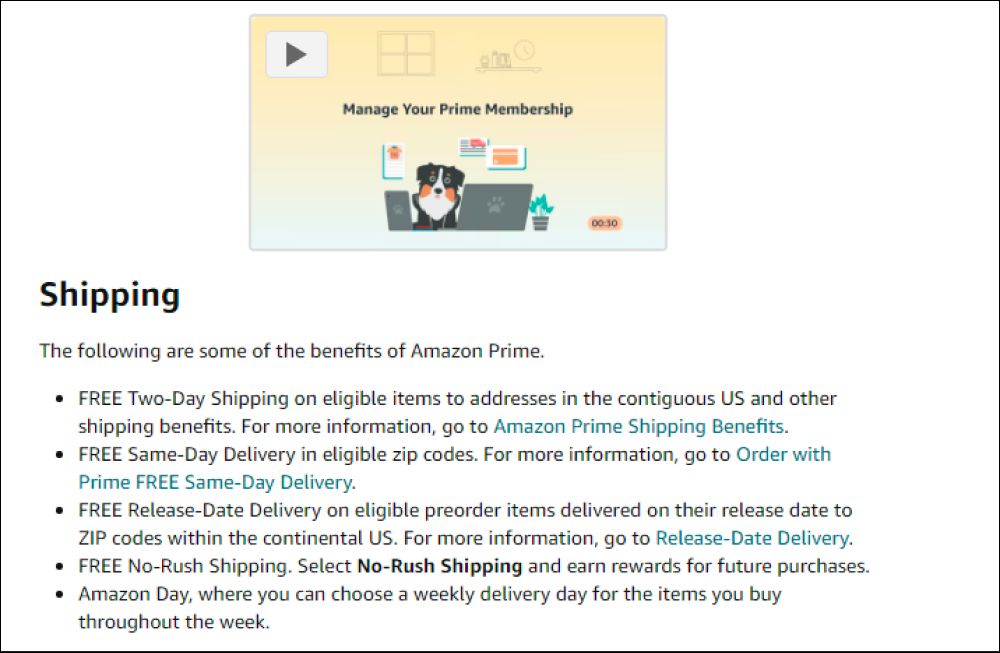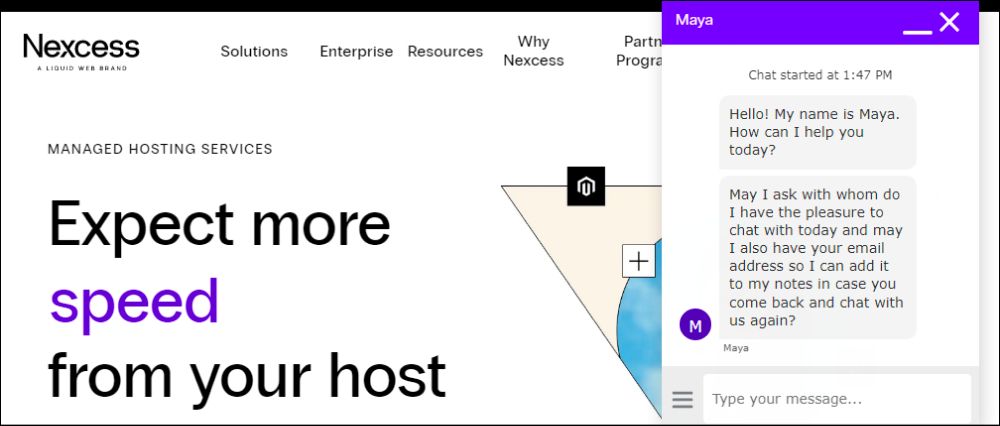Let's be honest — starting and running an ecommerce store isn’t easy. You have to compete with larger and more established brands. And you're up against some stiff competition.
But don't let that discourage you.
There are a lot of advantages to running an ecommerce store, and with the right knowledge and tools, you can overcome most disadvantages.
So if you're thinking about starting an online store, or if you've already started one but are struggling, then read on.
Here's what we'll cover:
- First off, what exactly is ecommerce?
- Disadvantages of setting up an ecommerce business
- Final thoughts: Ecommerce disadvantages and how you can beat them
First off, what exactly is ecommerce?

Ecommerce, or electronic commerce, is the buying and selling of goods and services over the internet. Ecommerce includes business-to-business (B2B), business-to-consumer (B2C), consumer-to-consumer (C2C), and consumer-to-business (C2B).
It's a big industry, and it's only getting bigger. Projections show that global ecommerce sales will reach about $8.1 trillion by 2026.
Global sales are just one of the benefits of owning an ecommerce store. Ecommerce has many advantages that are helping to fuel rapid growth, such as:
- Increased reach: Online stores can reach a much larger audience than traditional brick-and-mortar stores because people can shop from almost anywhere you're willing to ship to. You also have access to a huge pool of potential customers — the online audience is estimated at five billion people.
- Lower costs: Costs to run an ecommerce business are generally much lower than with traditional stores because you don’t have to maintain multiple storefronts.
Sell your products online, worry-free
Officially recommended by WooCommerce, our hosting is made for online businesses like yours
- Convenience: Many customers find shopping online is much more convenient than going to a store, as they can shop from the comfort of their own homes without the need for travel or dealing with crowds. Customers can also compare prices between stores and find the best deals.
- Personalization: Ecommerce businesses can use data to personalize the shopping experience for their customers, making it more likely that they'll make a purchase. For example, an ecommerce store may use previous purchases to offer personalized product recommendations on the homepage the next time the customer visits.
- Increased efficiency: Ecommerce businesses can automate many of their processes, such as order fulfillment and customer service, making them more efficient than traditional stores.
- 24/7 availability: Online businesses are available 24/7, meaning customers can shop at any time that’s convenient for them.
But these advantages fueling the growth of ecommerce are only one side of the story. Let’s look at the disadvantages of ecommerce and how to combat them.

Disadvantages of setting up an ecommerce business
Like any business model, ecommerce has disadvantages. But if you know what to expect and how to deal with it, you can overcome these challenges.
Here are some of the key challenges and disadvantages of ecommerce.
Privacy and security
Privacy and security is a top concern for most customers when shopping online. As news of increasing cybercrime continues to highlight data breaches, identity theft, and hacks, consumers are wary of who they trust with their personal and financial information.
And customers aren’t the only ones at risk. The average cost to a company for a data breach in 2023 is expected to rise to $5 million per breach, according to Acronis.
The good news is that there are steps you can take to mitigate these risks and better secure your website:
- PCI compliance: Ensure your ecommerce website is PCI compliant. This set of standards covers how data is handled and secured. Part of PCI compliance will require you to meet certain host and payment processing standards.
- Pick a strong web host: Invest in a reliable web hosting service, like Nexcess, that provides strong firewalls and encryption technology to protect customer data. You can help protect customer data by using a reliable content delivery network (CDN), such as the Nexcess Edge CDN powered by Cloudflare, to improve load speeds and keep customer information safe.
- Secure credit card payments: Use a secure payment processor (like PayPal or Stripe) to improve transaction security. Using a high-quality payment processor that stays up to date on the latest security measures and meets PCI compliance will help ensure your ecommerce company’s security.

- Stay up to date: Keep up with the latest trends and technologies in digital security by taking courses or staying abreast of ecommerce news.
- Staff training: Ensure your staff is trained in good security habits and processes.
- Tell your customers: Once you have good security in place, be sure to include statements on your website letting your customers know what you’re doing to protect them. Transparency helps build customer trust.
By taking these simple steps, you give customers peace of mind when shopping on your website and ensure that their data is safe and secure.
Delivery issues

One of the main disadvantages of ecommerce is that it can be difficult to get products to your customers' doorsteps. This is often due to a lack of infrastructure and can lead to delivery delays and, in extreme cases, canceled orders.
Damage to products during transit and products not arriving at all are also issues you need to consider.
These problems can be very frustrating for customers and can cause them to lose faith in your brand. As an ecommerce business owner, it's important to do everything you can to avoid these issues.
Try these steps to help address your delivery issues:
- Make sure you have a reliable logistics partner.
- Plan your shipping routes carefully to avoid traffic congestion and delays.
- Use sturdy packaging that will protect your products during transit.
- Provide customers with fast, reliable shipping options that fit their budget and timeline.
- Offer free shipping when possible.
- Ensure customers are informed of their delivery status frequently.
No touch-and-feel products

One of the downsides to ecommerce stores is that customers can’t touch and feel the products before buying them. This can be a turnoff for some people who still prefer brick-and-mortar stores.
But there are still plenty of ways to overcome customer reluctance due to the lack of contact with products:
- Provide detailed sales descriptions and high-quality images of the products on your website.
- Add product videos whenever possible. Demonstration videos can be especially powerful.
- Add a customer review section to provide social proof and give customers a sense of what their peers think about the product or service.
- Add an FAQ section or page.
- Make your returns process simple to provide assurance that if customers don’t like their purchase they can return it easily.
By implementing these tips, you can fill in the information gaps and put your customers at ease so they’re more likely to make a purchase.
Lots of competition
The ecommerce industry is one of the most competitive industries out there, which can make it difficult to stand out from the crowd and attract customers. But don't be discouraged—there are plenty of ways you can combat this problem.
- Focus on differentiating your brand, such as by offering unique products or services or better customer service than your competitors.
- Offer exclusive deals and discounts, or use targeted ads and email marketing campaigns to reach your ideal customers.
- Create content, such as blog posts and videos, to help build an engaged audience that trusts and supports your brand.
- Create a positive customer experience that encourages loyalty and engagement with your brand.
- Invest in a sophisticated CRM to help you keep track of customer information, build relationships, and deliver personalized experiences across all channels.
- Keep up with industry trends, so you're aware of what's going on in the ecommerce space.
Knowing what your competitors are doing will empower you to stay ahead of the curve and potentially gain an edge over them in terms of customer loyalty.
Customer service barriers

A common disadvantage for ecommerce stores is difficulty in providing high-quality customer service. While many online shoppers prefer the lack of human interaction during the shopping experience, there are still times when they need help.
When your customers need assistance, they need to be able to access it quickly and receive it in a manner that works best for them.
To address this issue, you must keep the customer in mind at all times:
- Ease of use: Make sure your website is as easy to use and straightforward as possible. This gives customers the information they need to make a purchase without having to call or email for help (in most cases).
- Multiple options: Offer multiple options for accessing customer service, such as live chat, phone, email, and text. Having multiple customer service options helps both with accessibility and with making your customers feel like they have more control over the buying process.
- Easy to find: Ensure your customer service help options are easy to find and access.
- Respond quickly: Provide responses to customer questions in a timely manner appropriate for each channel. Live chat is a real-time channel where a minute’s delay could cost you the sale, but emails are often expected to have a 24-hour delay.
- Team training: Train your customer service team in your company products and services, and provide the documentation they will need to answer most customer questions and deliver high-quality service.
Final thoughts: Ecommerce disadvantages and how you can beat them
There's no question that ecommerce has revolutionized the way businesses operate, but it's not without drawbacks. By understanding the advantages and disadvantages of ecommerce, you can put yourself in a better position to succeed in this rapidly growing industry.
Just like location is vital for brick-and-mortar stores, your web host is vital for ecommerce. Try out Nexcess’ powerful managed WooCommerce hosting for your ecommerce store.

